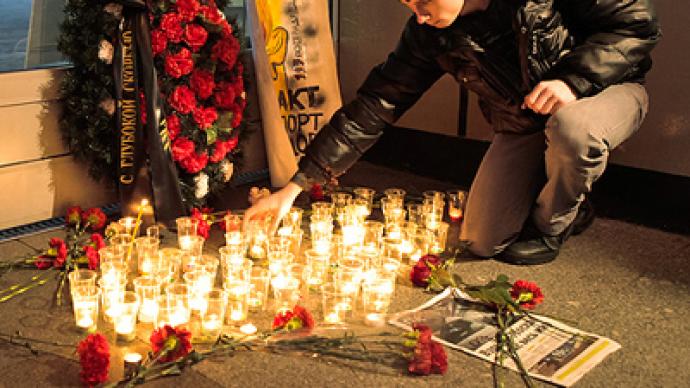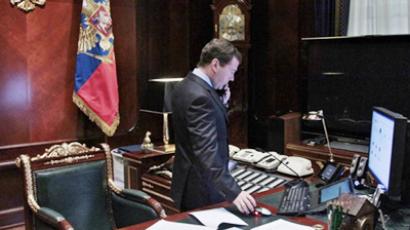Moscow grieves for those killed in Domodedovo blast

State flags have been lowered in Moscow as the city mourns 35 victims of Monday's terrorist attack at Russia's busiest airport.
People are gathering at Domodedovo Airport to pay their respects to those killed in Monday's suicide bombing. It was Russia's worst terrorist attack since its capital's Metro was bombed last March.People are flocking to the site of the blast to lay flowers and pay tribute to those, who lost their lives at Domodedovo. Not only Muscovites and other Russians were harmed in this tragedy. Over fifteen nationalities have been affected, including German, Italian, French and British citizens.Major TV channels and radio stations are changing their broadcasting schedule for Wednesday; no entertainment programs or commercials will be aired today.Church services have been held in various churches across the country. A commemorative service is to be held at the church that is located on the premises of Domodedovo Airport and at the chapel inside the airport as well.Citizens of Moscow are trying to help in any way they can. For the past two days people have been heading to blood centers all over Moscow to donate blood to cater for the increased demand and assist those in need.Flowers are being brought to the main building of the airport and candles are being lit.Passengers arriving at the airport, flight attendants and workers – all are coming to the arrivals area to pay respect to those who died.American ambassador to Russia John Beyrle was among those who came. He said that though some Western media have been saying that Russians seem to be cold-hearted and rigid in the aftermath of the tragedy, he believes that they are doing just the right thing.
"These flowers are just my expression on the behalf of the American people of our solidarity with the Russian people today, the day of national mourning [sic]. We are grieving together with the families who lost their loved ones and we are expressing our solidarity with the Russian people and the Russian government that there can be no refuge for monsters who are capable of carrying out an attack like this against us," John Beyrle said.He also said that the best way to fight terrorism is to show that life goes on and to continue living.The Kremlin has announced that the head of the transport division of the Ministry of the Interior has been fired.Dmitry Medvedev promised that the firings will continue and he is really serious, because the transport security program adopted in 2007 is not functioning properly. The president said he expects police officials and transport security involved to start acting on that program immediately – and not just in the airports and not only in Moscow.There has also been information from the member of the Security Commission of the Federation Council who said that in fact the federal security services knew about possible attacks and in fact had been acting on them. Some of those preparing terror acts in the Russian capital were allegedly apprehended earlier this year, but unfortunately the Domodedovo blast was still not prevented.The Domodedovo Airport authorities insist they are not responsible for the security breaches which led to the horrible terrorist act in capital’s busiest airport.
Domodedovo terror blast has nothing to do with Chechnya – Putin
Russian Prime Minister Vladimir Putin announced on Wednesday that, according to preliminary information, the terror blast at Domodedovo Airport has nothing to do with the Russian republic of Chechnya.Meanwhile, “The Telegraph” newspaper believes “the two suicide bombers who carried out the Moscow attack were thought to be part of a suicide squad trained in Pakistan's al-Qaeda strongholds and sent to the capital to target the city’s transport system”.For a long time, the West has regarded what has been happening in Russia as rebels or separatist movements. But now it has become clear that this threat is international and should be addressed by the worldwide community.Ivan Eland, a Senior Fellow at The Independent Institute in Washington DC, suggests that the terrorists might have been trained in Al-Qaeda-controlled areas in Pakistan. He also points out that, despite representing what is commonly known as Islamists, religion is not necessarily the principal reason behind their actions.“The problem that you have with those areas is that there are many groups and they all have different causes that they are fighting for,” he told RT. “It seems like all these people are Isramists – what we generally call ‘Islamists’ – but they often have separate goals.”“There are people there that are fighting Indians in Kashmire, and there are probably Chechens there that are interested in attacking Russia… Al-Qaeda focuses on the US, other groups focus, as I mentioned, on India,” Ivan Eland added.
Pakistan Bureau Chief for Asia Times Online, Syed Saleem Shahzad, links the recent terror attack on Domodedovo Airport to Al-Qaeda activities in Pakistan and Afghanistan. What with the US reducing their troops in the region in July 2011 and Russia delivering military hardware to the Western troops in Afghanistan, Al-Qaeda has started developing its counter-strategy, Syed Saleem Shahzad believes. Al-Qaeda’s territory is expanding and the international players already regard it as an international threat, he continues. “They [Al-Qaeda] also aim to go into Middle East [and] Northern Africa, as well as they have a plan to take this war into Western capitals. Moscow is a good example,” Syed Saleem Shahzad warns.
Matthew Clements, a terrorism expert with Jane's Defense Group in London believes that it is impossible to safe-guard completely against terrorist attacks.“If you look at the sheer scale of the transport networks in Moscow itself – the size of major train stations, of airports – it is very difficult to enact security that will be a hundred per sent foolproof. Even in the most advanced Western countries such as the United States and UK there is always going to be weak links in transport section where people gather,” he said “There is always going to be an opportunity for terrorists to strike at these.”
The explosion shattered Moscow’s Domodedovo Airport on Monday, January 24 at around 4:30pm. A suicide bomber came into the building via a parking lot entrance. The blast happened in the arrivals hall among a crowd of people who were meeting travelers and those exiting from the baggage claim area. The bomb was packed with shrapnel and other damaging components.
List of the 35 people killed in the Domodedovo blast
1. Babarykin, Vladimir, 1966, Russian Federation2. Babenko, Marina, 1965, Russian Federation3. Gataulin, Ildus, 1974, Russian Federation4. Garkin, Igor, 1955, Russian Federation5. Petrunina, Irina, 1991, Russian Federation6. Pernyatin, Viktor, 1949, Russian Federation7. Yurashku, Nikolay, 1924, Russian Federation8. Kochergin, Nikolay, 1942, Russian Federation9. Lapshov, Denis, 1973, Russian Federation10. Volkova, Natalya, 1971, Russian Federation11. Tomin, Oleg, 1974, Russian Federation12. Smirnov, Boris, 1958, Russian Federation13. Pustovalov, Boris, 1949, Russian Federation14. Badrashov, Kirill, 1972, Russian Federation15. Baybuza, Kirill, 1987, Russian Federation16. Shishkin, Konstantin, 1959, Russian Federation17. Izmailov, Vadim, 1964, Russian Federation18. Isaeva, Natalya, 1986, Russian Federation19. Lozhmaridze, Vakhtang, 1972, Russian Federation20. Belousov, Valery, 1962, Russian Federation21. Dubovitsky, Viktor, 1972, Russian Federation22. Matveev, Ilya, 1976, Russian Federation23. Khripankov, Andrey, 1967, Russian Federation24. Sigmatulin, Renat, 1966, Russian Federation25. Shmatyuk, Viktor, 1957, Russian Federation26. Zubritsky, Aleksey, 1975, Russian Federation27. Chuvakov, Aleksey, 1970, Russian Federation28. Dzhabarov, Sabir, 1963, Tajikistan29. Khaknazarov, Murat, 1987, Tajikistan30. Mombetov, Orinbay, 1965, Uzbekistan31. Ivanov, Nikolay, 1969, Austria32. Wallner, Heidi Marie, 1961, Austria33. Minderop, Hendrick, 1976, Germany34. Mashutina, Anna, 1981, Ukraine 35. Causland, Gordon Campbell, 1971, Great Britain (preliminary identification)
Information as published on the official site of Russia’s Ministry of Emergency Situations (in Russian).














